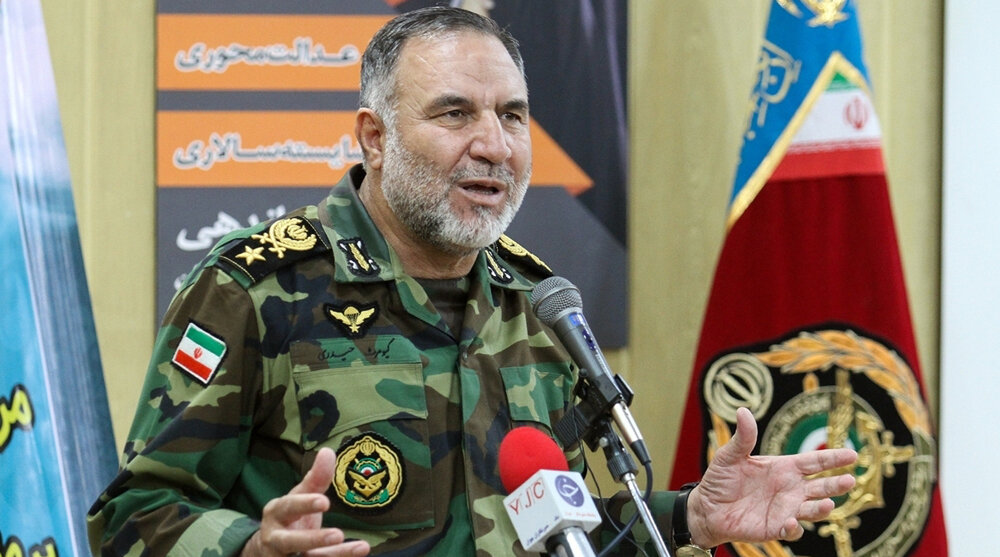Iranian army urges Taliban to respect border regulations

TEHRAN- A top Iranian commander warned on Sunday that if Afghanistan fails to observe international norms and the values of good neighborliness, the Islamic Republic will change its approach.
Brigadier General Kioumars Heidari, Commander of the Iranian Army’s Ground Force, issued the warning a day after Afghan Taliban fighters launched an aggressive offensive across Iran’s southern border, sparking a robust response from Iranian border guards.
General Heidari issued the warning during a visit to the southeastern province of Sistan-Baluchestan.
“If the neighboring state respects international border regulations, we will observe the principles of good neighborliness in return and display mutual respect,” the top commander added.
The commander emphasized that if the neighbors disobey international laws, Iran would adopt a different course of action toward them.
He also said that the Iranian Army’s Ground Forces had sole control of the regions along the border with Afghanistan.
An Iranian border guard was killed and two civilians wounded during the exchange of gunfire on Saturday. The shooting was triggered by the Afghan sides. The interim Taliban government said an Afghan border guard was also killed.
Late on Sunday, Iranian Interior Minister Ahmad Vahidi reacted to the recent border clashes between Iran and Afghanistan, saying that the clashes came to an end after Iran responded to the Afghan side.
“These clashes were brief, the necessary response was given to the Afghan border guards, and now there is no problem for traffic at the border point,” Vahidi said, according to IRNA. “There was a shooting by the Afghan border guards, and naturally, they were responded to appropriately.”
He added, “The conflicts were later resolved and negotiations were held with the Taliban side.”
Vahidi continued, “Currently, we do not have any problems and the border point is open for traffic and is in peace.”
Tensions have recently escalated between Iran and Afghanistan over water rights and border clashes. On Saturday, the Iranian border police and Taliban troops engaged in an exchange of fire in a border region east of Iran.
Based on the 1973 treaty, Iran should annually receive 820 million cubic meters of water from the Helmand River.
Afghanistan has redirected the course of the river and built dams on its path. Hassan Kazemi Qomi, Tehran’s special envoy for Afghanistan, has said Iran just receives 4 percent of the water.
The move has caused the Hamoun wetland in the border province of Sistan-Baluchestan province to dry up. The lives of a large percentage of the people in the neighborhood is dependent on the river. It is a source of drinking water and irrigation. The livelihood of fishermen is also dependent on the lake.
Iranian analysts are saying that the Taliban is not thankful to Iran which has been supporting Afghanistan for more than four decades.
Iran has been hosting millions of Afghan refugees since the Soviet Union invaded the country in late 1979. Iran has been home to the Afghans despite the fact that it is under unprecedented U.S. economic pressure.
On Thursday, prior to the border clash, Iran’s Foreign Minister Hossein Amir Abdollahian said that Iran will not recognize the Taliban and that the Islamic Republic insists on an inclusive government in Afghanistan.
“We will not recognize the current rulers of Afghanistan and insist on the need to establish an inclusive government in Afghanistan,” Amir Abdollahian told an annual gathering of Iranian diplomats in the shrine of Imam Khomeini.
He added, “The Taliban is part of the reality of Afghanistan but not all of Afghanistan.”
“Afghanistan is an important issue for us. We are unpleased that an inclusive government has not been formed in Afghanistan and we have announced this to the current rulers of Afghanistan,” the foreign minister explained.
The foreign minister went on to say that Iran has long borders with Afghanistan and “there is no option other than interaction between the two countries.”
Prior to the Sunday deadly border clash, sporadic clashes had happened in border areas during the past months. In his Thursday remarks, Amir Abdollahian said such incidents are a “source of concern”.
Iran does not like an incident similar to the one that happened in Mazar-i-Sharif in late 1990s to emerge again, Amir Abdollahian also said.
On August 8, 1998, Taliban forces captured Mazar-i-Sharif and killed 11 Iranian diplomats and a journalist.
